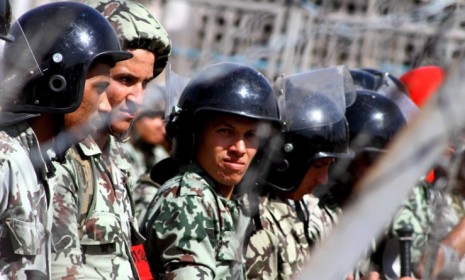Should Obama cut ties with Egypt's military?
Military leaders appear to be squashing Egypt's young experiment in democracy, but the U.S. continues to send them more than $1 billion per year

A free daily email with the biggest news stories of the day – and the best features from TheWeek.com
You are now subscribed
Your newsletter sign-up was successful
The pro-democracy revolution that brought down Egyptian strongman Hosni Mubarak is in danger of being hijacked. First, a court packed with Mubarak-era judges dissolved the country's first freely elected parliament, which was dominated by the Muslim Brotherhood. Then, the ruling military council, also comprised of Mubarak's former cronies, issued a "constitutional declaration" giving itself sweeping new powers, including control over the writing of a constitution and immunity from oversight. And on Tuesday, the presidential campaign of Ahmed Shafiq, the last prime minister under Mubarak, claimed that Shafiq had won Egypt's presidential election, countering the Muslim Brotherhood's claims that its candidate, Mohammed Morsi, was the winner. The Obama administration has warned the military that it could suspend some $1.3 billion in yearly aid if military leaders fail to transfer power to civilian control. Is it time for Obama to cut ties with Egypt's military?
Yes. Obama must stand on the side of democracy: The military council has unjustly "tightened its grasp on power," turning the country's president into little more than a "toothless figurehead," says Sara Khorshid at The New York Times. And despite the "blatant power grabs," the U.S. continues to support the military. Indeed, "American-made tear gas canisters are still being used" against pro-democracy protesters. "If the Obama administration genuinely supports the Egyptian people in their pursuit of freedom," it must withdraw its support for the military council.
"The betrayal of Egypt's revolution"
The Week
Escape your echo chamber. Get the facts behind the news, plus analysis from multiple perspectives.

Sign up for The Week's Free Newsletters
From our morning news briefing to a weekly Good News Newsletter, get the best of The Week delivered directly to your inbox.
From our morning news briefing to a weekly Good News Newsletter, get the best of The Week delivered directly to your inbox.
But backing the Muslim Brotherhood would be a mistake: Instead of threatening the Egyptian military, it might be a "good moment for the U.S. government to remain quiet," says Barry Rubin at PJMedia. The Muslim Brotherhood has supposedly become more moderate in recent years, but the group has a long history of anti-American and anti-Israeli positions. The Egyptian military, on the other hand, has been America's strongest Arab ally in the region since the 1970s. While it may seem immoral, the U.S. government should "secretly be backing the military to keep the Brotherhood out of power."
"Egypt: Things to think about as we await the presidential election outcome"
Actually, we should ditch the military and back the Brotherhood: Egyptians won't stand for the military's power grab, and the armed forces will eventually face a day of reckoning, says Max Boot at Commentary. If America shuns the Muslim Brotherhood, it would only allow the group "to claim the cloak of martyrdom," while the U.S. would plummet in public standing "if it appears to connive in this military coup." For America's sake, Obama should tell the military, "in no uncertain terms, that they need to take a step back from the political arena."
"Let the Brotherhood rule in Egypt"
A free daily email with the biggest news stories of the day – and the best features from TheWeek.com
-
 How the FCC’s ‘equal time’ rule works
How the FCC’s ‘equal time’ rule worksIn the Spotlight The law is at the heart of the Colbert-CBS conflict
-
 What is the endgame in the DHS shutdown?
What is the endgame in the DHS shutdown?Today’s Big Question Democrats want to rein in ICE’s immigration crackdown
-
 ‘Poor time management isn’t just an inconvenience’
‘Poor time management isn’t just an inconvenience’Instant Opinion Opinion, comment and editorials of the day